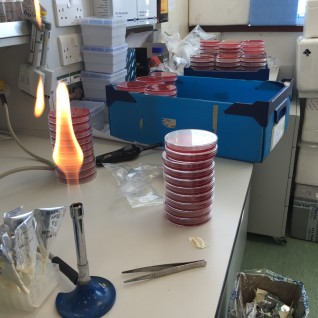By Megan De Ste Croix, University of Leicester
 On the 28th February this year I submitted my PhD thesis, and on the 1st of March I started my first post-doc position. I was lucky enough to have a wonderful PhD supervisor who I worked well with and even more lucky that he had a post-doc position available close to when I planned to submit. In the time since I officially started as a post-doc I’ve learnt that it’s a bit more than a PhD project with the title.
On the 28th February this year I submitted my PhD thesis, and on the 1st of March I started my first post-doc position. I was lucky enough to have a wonderful PhD supervisor who I worked well with and even more lucky that he had a post-doc position available close to when I planned to submit. In the time since I officially started as a post-doc I’ve learnt that it’s a bit more than a PhD project with the title.
These are some things I have taken away from the experience that I thought might be helpful for anyone considering applying for a post-doc position, whether in the same lab or somewhere else:
- There will be people who have only ever known you as a post-doc
This can be because they’ve joined the lab after you finished your PhD, or because you’ve started in a new lab. The longer you’re in a lab the more likely it is the people you consider to be senior will move on to new jobs, which, as a post-doc (even a new one) leaves you as one of those senior people. People might come to you with questions and problems which are bigger than “where can I find x, y or z?” and you might not know the answers, but you do have 3-4 years of practical experience to offer so don’t think your advice isn’t worth listening to.
- You will work on much more than just your project or grant

While I was doing my PhD I thought I was working at max, and I was, but I was mostly working on ‘my’ project. I had a thesis to write. My supervisor often had me share work and help on bits and pieces of other projects, but my main focus was always my PhD project. I now have so many more things to look after that are part of our day to day running, like our lab’s strain collection. The strain collection is all the mutants we’ve ever made and bacterial strains we’ve received from other labs. We keep two frozen tubes of every strain so nothing can get lost.
- Your workload will increase
Because of those extra jobs (and people thinking you know what you’re doing) as a post-doc there’s even more to do every day. Throughout my PhD I struggled to feel on top of my constantly growing workload. I eventually found that a ‘do later’ list is what works best for me. Even with a greater workload I feel more on top of things than I have in a while. My ‘do later’ list lives on my office wall and frees my brain up for day to day jobs.

- If you stay in the same place you will still get referred to as a PhD student (and get all the emails that go with it)
This is the exact opposite of point 1 but I can’t count how many times I’ve been referred to as the PhD representative on committees or asked if I can demonstrate for a practical unit since becoming a post-doc. People forget, or may not even know, that you’ve finished your PhD. It’s a little frustrating, but it’s just something that takes time. Politely correct people and eventually your new job title will stick.
- You may actually, at times, feel more on top of things
Realising and accepting that to do lists will always be added to has let me feel much more on top of my ever growing workload. If you don’t feel this way don’t worry. It’s a feeling that comes and goes for me. Sometimes I’m just as overwhelmed as I was as a PhD student, other times I feel like I can handle it all. Mostly I hover in the middle.
PhD student to post-doc was a harder transition than I expected. Staying in the same lab definitely has advantages and disadvantages, but overall, working in a great team, on an interesting project means I’m really glad I stayed.
About Me

After submitting my PhD thesis earlier this year (on epigenetics in pathogens) I’ve realised that I have to stop telling people I’m a microbiologist pretending to be a geneticist, as I now have a PhD in Genetics. Since finishing my PhD I’ve been working as a Post-Doc at the University of Leicester. When I’m not in the lab I’m usually doing some SciComm/outreach work with GENIE or The Brilliant Club.
You can find me on Twitter @megandsc or at my blog Daily Life of a PhD, which is currently undergoing a bit of a re-brand. My blog is an honest look at the ups and downs of working in academia. If you’d like to know more about my work, getting involved in outreach or my blog please get in touch, I’d love to hear from you.


Honestly speaking, I don’t think this is a fair description a postdoc. Most of the students are already overloaded with work during their PhD, above all if the professor is young and just started. Postdoc is a the further step before getting a lectureship, a 2-3 year period of time to really stand out and come up with your own scientific ideas, applying for grants, make a breakthough in science.
The description above didn’t provide any of this information and it appear to me that doing a postdoc simply means prolonging your PhD time. Changing lab doesn’t necessarly mean having a transition, what should be really changing is your mind-set and approach to science.
LikeLike